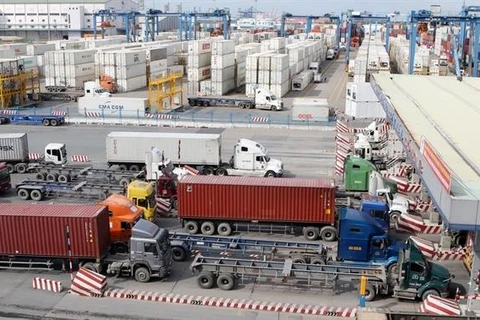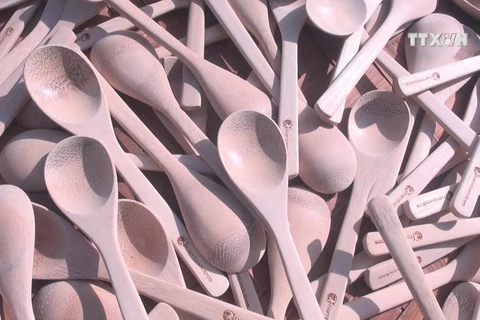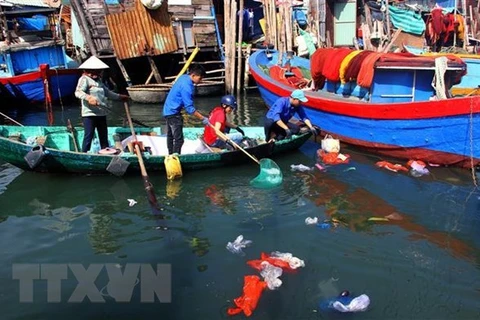 Bamboo straws aren’t recyclable because bamboo can’t be recycled. But overall they are 99 percent biodegradable. (Photo courtesy of Nguyen Van Mao)
Bamboo straws aren’t recyclable because bamboo can’t be recycled. But overall they are 99 percent biodegradable. (Photo courtesy of Nguyen Van Mao) Hanoi (VNA) – People are turning against plastic straws, and a 32-year-old man has come up with a reusable bamboo alternative for the once ubiquitous and popular item that has become a symbol of the throw-away culture and the proliferation of non-recyclable materials.
Nguyen Van Mao was preparing to return to his hometown in the central province of Nghe An to visit his fourth bamboo drinking straw workshop that opened few months ago.
Mao, alias “Mao Meo” (Cat), said with a monthly production capacity of 3-5 million straws, the workshop is the biggest of his facilities.
The workshop in Nghe An, together with others in Hanoi, the southern province of Dong Nai and the Central Highland province of Gia Lai, are operating at full capacity to meet increasing orders from domestic and foreign partners, which amount to 6 million straws each month.
Mao officially began the production of bamboo straws earlier this year while running a bamboo flute company. But the idea for it had been in his mind for some time, going back to when he was a student at the Hanoi Architectural University.
It was about reducing plastic waste by reinventing the conventional straw in an eco-friendly way, using a naturally grown, biodegradable material like bamboo.
Bamboo straws unrecyclable but biodegradable
 Although bamboo straws cost several times more than plastic varieties, they can be used for six months with regular cleaning and proper preservation. (Photo courtesy of Nguyen Van Mao)
Although bamboo straws cost several times more than plastic varieties, they can be used for six months with regular cleaning and proper preservation. (Photo courtesy of Nguyen Van Mao) Mao said bamboo and rattan pipes are cut into pieces 15 to 25 cm long and dried at 120 degrees Celsius.
“Although bamboo straws cost several times more than plastic varieties, they can be used for six months with regular cleaning and proper preservation.”
Each straw comes with a handy brush to clean it with. In order to ensure the longevity of the straws, after hand washing, you have to let them fully dry to prevent any water building up inside the straws and always store them in a well-ventilated area,” he added.
Bamboo straws aren’t recyclable because bamboo can’t be recycled. But overall they are 99 percent biodegradable, he said.
Mao’s bamboo straws are used by many hotels, restaurants and coffee shops nationwide, and exported to major markets like the US, Germany, France, Japan, the Republic of Korea and Taiwan.
He earns from 12-14 billion VND (516,000-602,000 USD) per month and employ about 200 people.
The first order was for 2,000 straws to be shipped to Hungary. After Mao’s products received a certificate of food safety and hygiene in Germany, foreign clients started visiting his workshop and placed orders for millions of straws.
 Nguyen Van Mao (left) and Nguyen Anh Dung, head of the Vietnam Economic and Cultural Office in Taipei (China) at the cultural exchange. (Photo courtesy of Nguyen Van Mao)
Nguyen Van Mao (left) and Nguyen Anh Dung, head of the Vietnam Economic and Cultural Office in Taipei (China) at the cultural exchange. (Photo courtesy of Nguyen Van Mao) Last March, Mao introduced his products to Taiwanese customers and businesses during a cultural exchange in Taiwan (China) and signed several contracts with local partners.
Asked about the difficulties of starting up, Mao said he had travelled hundreds of kilometres through mountainous areas by motorbike to find materials for production.
“There are different types of bamboo and not all of them can be used for drinking straw production,” he said.
He had to spend a huge amount of money promoting bamboo straws as plastic varieties are widely available and convenient. It also took time to raise public awareness of the benefits brought about by using environmentally-friendly products as well as the long-term harmful effects of plastic.
Mao said that although there are vast bamboo and rattan areas to source his business, they may be exhausted one day. Therefore, the exploitation must be selective and his company is implementing a project to plant bamboo and rattan trees.
He is also seeking ways to reduce the price of his straws in the domestic market in order to encourage more people to use them. Besides, he plans to produce more environmentally-friendly products from bamboo and rattan like spoons, forks, bowls and cups in the future.
“I intend to create a full collection of eco-friendly products that give consumers an affordable alternative to using plastic ones. I hope that youngsters don’t just switch to bamboo straws because it’s the new trend and then revert back to plastic,” Mao said.
World drowning in plastic pollution
The United Nations revealed that the world produces about 300 million tonnes of plastic every year. That’s nearly equivalent to the weight of the entire human population.
Only 9 percent of all plastic waste ever produced has been recycled. About 12 percent has been incinerated, while the rest – 79 percent – has accumulated in landfills, dumps or the environment.
He had to spend a huge amount of money promoting bamboo straws as plastic varieties are widely available and convenient. It also took time to raise public awareness of the benefits brought about by using environmentally-friendly products as well as the long-term harmful effects of plastic.
Mao said that although there are vast bamboo and rattan areas to source his business, they may be exhausted one day. Therefore, the exploitation must be selective and his company is implementing a project to plant bamboo and rattan trees.
He is also seeking ways to reduce the price of his straws in the domestic market in order to encourage more people to use them. Besides, he plans to produce more environmentally-friendly products from bamboo and rattan like spoons, forks, bowls and cups in the future.
“I intend to create a full collection of eco-friendly products that give consumers an affordable alternative to using plastic ones. I hope that youngsters don’t just switch to bamboo straws because it’s the new trend and then revert back to plastic,” Mao said.
World drowning in plastic pollution
The United Nations revealed that the world produces about 300 million tonnes of plastic every year. That’s nearly equivalent to the weight of the entire human population.
Only 9 percent of all plastic waste ever produced has been recycled. About 12 percent has been incinerated, while the rest – 79 percent – has accumulated in landfills, dumps or the environment.
 In Vietnam, it is estimated that 1.8 million tonnes of plastic waste are generated every year, with plastic consumption increasing 16-18 percent annually. (Photo: VNA)
In Vietnam, it is estimated that 1.8 million tonnes of plastic waste are generated every year, with plastic consumption increasing 16-18 percent annually. (Photo: VNA) In Vietnam, it is estimated that 1.8 million tonnes of plastic waste are generated every year, with plastic consumption increasing 16-18 percent annually. Vietnam is listed among the top five countries responsible for about 13 million tonnes of plastic dumped in the oceans every year.
Statistics from Vietnam’s Association of Plastic illustrate the scale of the problem. In 1990, each Vietnamese person consumed 3.8kg of plastic per year, but 25 years later, the figure hit 41kg.
And plastic straws are high on the list of the most common objects fouling the seas. They are routinely among the 10 most collected items in beach cleanup programs, according to the Wildlife Conservation Society.
One study published earlier this year estimated as many as 8.3 billion plastic straws pollute the world's beaches. They are rarely recycled and can take more than 100 years to degrade in water.
Straws, therefore, have become the villain of recent environmental campaigns across the world and in Vietnam in particular./.
VNA























